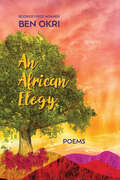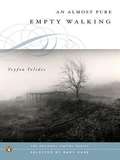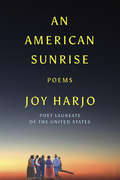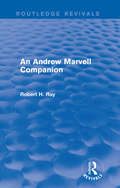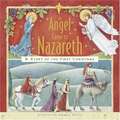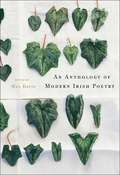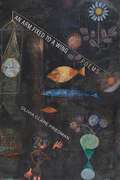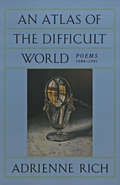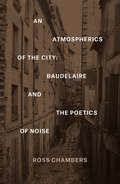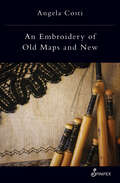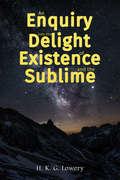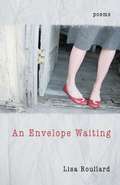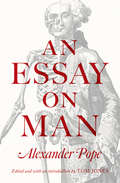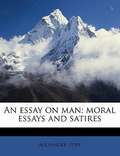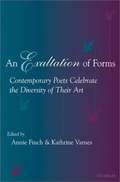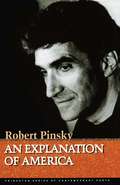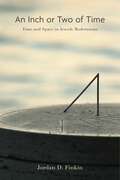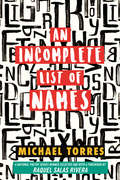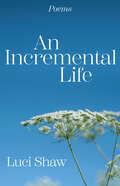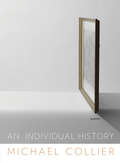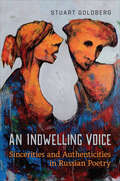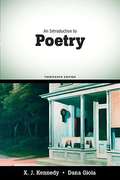- Table View
- List View
An African Elegy: Poems
by Ben OkriThis moving poetry collection from the Booker Prize–winning author finds strength and hope while reflecting on the complex issues that have burdened Africa.First published in 1992, Ben Okri&’s remarkable debut collection features poems that are now considered classics and taught in schools and universities worldwide. Here he plays with the mystique of the African continent, countering simplistic narratives of suffering that have been imposed on it with vibrant, nuanced portraits of the traditions and resilience of African peoples. An invaluable window onto Okri&’s experiences as a Nigerian immigrant to the United Kingdom and as a writer discovering his calling, these poems also speak to universal truths about love, injustice, and the search for meaning.
An Almost Pure Empty Walking
by Tryfon TolidesIn his debut collection, chosen by Mary Karr as a winner of the 2005 National Poetry Series, Tryfon Tolides weaves together poems that speak of desire, loss, and small joys. Tolides was born in a tiny village in Greece and his work is rooted in the mountains and wind and the deep interior of that place; his poems express a longing and a searching for peace, for home, for beauty, for escape. These poems constitute a lament, whether they concern themselves with the difficulties of assimilation or the question of whether it is possible for people to live with one another in a spirit of true understanding. They prove that the physical and the metaphysical can share residence, can even be one and the same. .
An American Sunrise: Poems
by Joy HarjoA nationally best-selling volume of wise, powerful poetry from the first Native American Poet Laureate of the United States. In this stunning collection, Joy Harjo finds blessings in the abundance of her homeland and confronts the site where the Mvskoke people, including her own ancestors, were forcibly displaced. From her memory of her mother’s death, to her beginnings in the Native rights movement, to the fresh road with her beloved, Harjo’s personal life intertwines with tribal histories to create a space for renewed beginnings.
An Andrew Marvell Companion (Routledge Revivals #Vol. 1243)
by Robert H. RayFirst published in 1998, this title provides for the reader of the renowned metaphysical poet and politician a valuable reference and resource volume. It is a compendium of useful information for any reader of Andrew Marvell, including crucial biographical material, historical contextualisation, and details about his life’s work. The intention throughout is to enhance understanding and appreciation, without being exhaustive. The major portion of the volume, in both importance and size, is ‘A Marvell Dictionary’. Its entries are arranged alphabetically: they identify, describe and explain the most influential persons in Marvell’s life and works, as well as places, characters, allusions, ideas, concepts, individual words, phrases and literary terms that are relevant to a rounded appreciation of his poetry and prose. An Andrew Marvell Companion will prove invaluable for all students of English poetry and seventeenth-century political history.
An Angel Came to Nazareth: A Story of the First Christmas
by Anthony KnottAS THE FIRST Christmas draws near, four travelers must make their way from Nazareth to Bethlehem. An angel asks four animals to choose which traveler they would like to carry. The horse chooses the brave soldier; the camel, the wise king; the ox, the good Samaritan. But the donkey, who chooses the poor woman with child, discovers that his humble-looking passenger is the one carrying the greatest of them all. Through its simple rhymes and lavish illustrations, this book conveys the very special spirit of the season.
An Anthology of Modern Irish Poetry
by Wes DavisNever before has there been a single-volume anthology of modern Irish poetry so significant and groundbreaking as An Anthology of Modern Irish Poetry. Collected here is a comprehensive representation of Irish poetic achievement in the twentieth and twenty-first centuries, from poets such as Austin Clarke and Samuel Beckett who were writing while Yeats and Joyce were still living; to those who came of age in the turbulent '60s as sectarian violence escalated, including Seamus Heaney and Michael Longley; to a new generation of Irish writers, represented by such diverse, interesting voices as David Wheatley (born 1970) and Sinéad Morrissey (born 1972). Scholar and editor Wes Davis has chosen work by more than fifty leading modern and contemporary Irish poets. Each poet is represented by a generous number of poems (there are nearly 800 poems in the anthology). The editor's selection includes work by world-renowned poets, including a couple of Nobel Prize winners, as well as work by poets whose careers may be less well known to the general public; by poets writing in English; and by several working in the Irish language (Gaelic selections appear in translation). Accompanying the selections are a general introduction that provides a historical overview, informative short essays on each poet, and helpful notes--all prepared by the editor.
An Anthology of the New England Poetry from Colonial Times to the Present Day
by Louis UntermeyerThis is a magnificent collection of poetry. The editor features the famous along with such lesser-known poets as Edward Taylor, Jones Very, William Ellery Channing II, Frederick Goddard Tuckerman and Anne Bradstreet, the first female (and Puritan) poet to be published. Introductory comments are interesting. "Here Cain and Abel come to sacrifice; Fruits of the Earth and Fatlings each do bring: On Abel's gift the fire descends from Skies, But no such sign on false Cain's offering. With sudden hateful looks he goes his ways, Hath thousand thoughts to end his brothers days, Upon whose blood his future good he hopes to raise. Who fancies not his looks now at the Bar ? His face like death, his heart with horror fraught. No Malefactor ever felt like war When deep despair with wish of life hath fought. Branded with guilt and crusht with treble woes, A Vagabond to Land of Nod he goes; ..." (Bradstreet) "
An Arm Fixed to a Wing: Poems
by Olivia Clare FriedmanOlivia Clare Friedman’s An Arm Fixed to a Wing seeks out the spiritual elements that haunt the everyday, the divine wing fastened to an earthly arm. Elegies and poems of nostalgia appear alongside pieces celebrating the speaker’s present moment, with the underlying knowledge that such moments slip past too easily. Several poems explore the theme of motherhood—the excitement and novelty, the routine and translucent sleeplessness. At the book’s center sits a sequence of narrative pieces, titled “Camera Poems,” exploring experiences of isolation, hopefulness, and self-awareness. While the poems in An Arm Fixed to a Wing acknowledge that loss is a constant, their tone is frequently wistful, evoking the desire to recover feelings of attentiveness and wonder toward one’s surroundings, both the mundane and the extraordinary.
An Atlas of the Difficult World: Poems 1988-1991
by Adrienne RichWinner of the Los Angeles Times Book Prize. In this, her thirteenth book of verse, the author of "The Dream of a Common Language" and "Snapshots of a Daughter-in-Law" writes of war, oppression, the future, death, mystery, love and the magic of poetry.
An Atmospherics of the City: Baudelaire and the Poetics of Noise (Verbal Arts: Studies in Poetics)
by Ross ChambersWhat happens to poetic beauty when history turns the poet from one who contemplates natural beauty and the sublime to one who attempts to reconcile the practice of art with the hustle and noise of the city?An Atmospherics of the City traces Charles Baudelaire’s evolution from a writer who practices a form of fetishizing aesthetics in which poetry works to beautify the ordinary to one who perceives background noise and disorder—the city’s version of a transcendent atmosphere—as evidence of the malign work of a transcendent god of time, history, and ultimate destruction.Analyzing this shift, particularly as evidenced in Tableaux parisiens and Le Spleen de Paris, Ross Chambers shows how Baudelaire’s disenchantment with the politics of his day and the coincident rise of overpopulation, poverty, and Haussmann’s modernization of Paris influenced the poet’s work to conceive a poetry of allegory, one with the power to alert and disalienate its otherwise inattentive reader whose senses have long been dulled by the din of his environment.Providing a completely new and original understanding of both Baudelaire’s ethics and his aesthetics, Chambers reveals how the shift from themes of the supernatural in Baudelaire to ones of alienation allowed a new way for him to articulate and for his fellow Parisians to comprehend the rapidly changing conditions of the city and, in the process, to invent a “modern beauty” from the realm of suffering and the abject as they embodied forms of urban experience.
An Embroidery of Old Maps and New
by Angela CostiI can see how I carry Yiayia's war in the ample dunes of my belly, the moment she smelt the guns, she pinched the candle's wick,gathered the startled shadows of her children,flung my baby-mother onto her backand sprinted towards the neutral moon—Migration and the memories of women's traditions are woven throughout these poems. Angela Costi brings the world of Cyprus to Australia. Her mother encounters animosity on Melbourne's trams as Angela learns to thread words in ways that echo her grandmother's embroidery. Here are poems that sing their way across the seas and map histories.
An Enquiry into the Delight of Existence and the Sublime
by H. K. G. LoweryIn his debut collection of poetry, H. K. G. Lowery explores a journey incorporating all the natural anxieties and pains of living, leading to an understanding of real forgiveness and redemption.From the first poem of the collection, An Ode to Father John Misty, he sets the scene touching on societal issues such as racism, homophobia, religion, addiction and consumerism. The darkness of such issues, as well as other emotional issues, are given light gradually when he journeys into the positive attributes of forgiveness, hope in the God, the wonderment of nature, self-acceptance and salvation. The collection begins to rotate towards the Sublime with A Requiem for St. Francis which holds a strong personal resonance from the time he visited Assisi in Italy.Each poem commences with an epigraph which summarises each individual poem. The final poem sees all twelve epigraphs combine into a conclusion of the collection which results in a cathartic outpouring where the delight of existence is realised.An Enquiry into the Delight of Existence and the Sublime is a personal journey, a rise from darkness to light, from despair to hope.
An Envelope Waiting
by Lisa RoullardPoems in this book by Lisa Roullard explore the world of mail: sometimes the poet escapes into it, sometimes the mailman from it. Themes of waiting and dating also surface and postage stamps capture first dates in Washington State. In 2013 poems from this collection placed first in the Utah Original Writing Competition.
An Essay on Man
by Alexander Pope Tom JonesVoltaire called it "the most sublime didactic poem ever written in any language." Rousseau rhapsodized about its intellectual consolations. Kant recited long passages of it from memory during his lectures. And Adam Smith and David Hume drew inspiration from it in their writings. This was Alexander Pope's Essay on Man (1733-34), a masterpiece of philosophical poetry, one of the most important and controversial works of the Enlightenment, and one of the most widely read, imitated, and discussed poems of eighteenth-century Europe and America. This volume, which presents the first major new edition of the poem in more than fifty years, introduces this essential work to a new generation of readers, recapturing the excitement and illuminating the debates it provoked from the moment of its publication.Echoing Milton's purpose in Paradise Lost, Pope says his aim in An Essay on Man is to "vindicate the ways of God to man"--to explain the existence of evil and explore man's place in the universe. In a comprehensive introduction, Tom Jones describes the poem as an investigation of the fundamental question of how people should behave in a world they experience as chaotic, but which they suspect to be orderly from some higher point of view. The introduction provides a thorough discussion of the poem's attitudes, themes, composition, context, and reception, and reassesses the work's place in history. Extensive annotations to the text explain references and allusions.The result is the most accessible, informative, and reader-friendly edition of the poem in decades and an invaluable book for students and scholars of eighteenth-century literature and thought.
An Essay on Man; Moral Essays and Satires
by Alexander PopeAn Essay on Man is a poem published by Alexander Pope in 1733-1734. It is an effort to rationalize or rather "vindicate the ways of God to man" (l.16), a variation of John Milton's claim in the opening lines of Paradise Lost, that he will "justify the ways of God to men" (1.26). <P> <P> It is concerned with the natural order God has decreed for man. Because man cannot know God's purposes, he cannot complain about his position in the Great Chain of Being (ll.33-34) and must accept that "Whatever IS, is RIGHT" (l.292), a theme that was satirized by Voltaire in Candide (1759). More than any other work, it popularized optimistic philosophy throughout England and the rest of Europe.
An Exaltation of Forms: Contemporary Poets Celebrate the Diversity of Their Art
by Annie Finch Kathrine VarnesThe essays in the book represent a remarkably diverse range of literary styles and approaches, and show how the forms of contemporary English-language poetry derive from a wealth of different traditions.
An Explanation of America (Princeton Series of Contemporary Poets #156)
by Robert PinskyFrom An Explanation of America:LAIR Robert Pinsky ? Inexhaustible, delicate, as ifWithout source or medium, daylightUndoes the mind; the infinite, Empty actual is too bright,Scattering to where the roadWhispers, through a mile of woods … Later, how quiet the house is:Dusk-like and refined,The sweet Phoebe-note Piercing from the trees;The calm globe of the morning,Things to read or to write Ranged on a table; the brainA dark, stubborn current that breathesBlood, a deaf wadding, The hands feeding it paperAnd sensations of wood or metalOn its own terms. Trying to read I persist a while, finish the recognitionBy my breath of a dead giant's breath--Stayed by the space of a rhythm, Witnessing the blue gulf of the air.
An Illuminated Darkness
by Jaques Coetzee(There are shards of light also, but I will say nothing about them. A cellphone camera is recording what may be shared of this moment afterwards.) <P><P>Unwanted prayers on your behalf, kindnesses that you end up resenting - living with visual impairment is less about matters of sight than it is about problems of perception. <P><P>A life without mirrors is not a life without self-examination. On the contrary, Jacques Coetzee's debut is a manifesto of personhood, a portrait of a world brought into being by its textures, its movements, and - most importantly - its music. Easy-flowing and sensuous, this is a collection of the unexpected, the strange, and the suddenly beautiful. Unavoidably and undeniably, Coetzee's is a truly unique perspective. <P><P>Jacques Coetzee, born in 1972, matriculated from the Pioneer School for the Blind in Worcester. He has worked as a busker at the Cape Town Waterfront, and has tutored English literature to first- and second-year university students. In 2002 he obtained a Masters in Creative Writing from the University of Cape Town, and in 2018, he and Barbara Fairhead published a joint anthology of poems, The Love Sheet. He currently lives in Cape Town, where he is a singer-songwriter in the band Red Earth & Rust.
An Inch or Two of Time: Time and Space in Jewish Modernisms (Dimyonot)
by Jordan D. FinkinIn literary modernism, time and space are sometimes transformed from organizational categories into aesthetic objects, a transformation that can open dramatic metaphorical and creative possibilities. In An Inch or Two of Time, Jordan Finkin shows how Jewish modernists of the early twentieth century had a distinct perspective on this innovative metaphorical vocabulary. As members of a national-ethnic-religious community long denied the rights and privileges of self-determination, with a dramatically internalized sense of exile and landlessness, the Jewish writers at the core of this investigation reimagined their spatial and temporal orientation and embeddedness. They set as the fulcrum of their imagery the metaphorical power of time and space. Where non-Jewish writers might tend to view space as a given—an element of their own sense of belonging to a nation at home in a given territory—the Jewish writers discussed here spatialized time: they created an as-if space out of time, out of history. They understood their writing to function as a kind of organ of perception on its own. Jewish literature thus presents a particularly dynamic system for working out the implications of that understanding, and as such, this book argues, it is an indispensable part of the modern library.
An Inch or Two of Time: Time and Space in Jewish Modernisms (Dimyonot: Jews and the Cultural Imagination #3)
by Jordan D. FinkinIn literary modernism, time and space are sometimes transformed from organizational categories into aesthetic objects, a transformation that can open dramatic metaphorical and creative possibilities. In An Inch or Two of Time, Jordan Finkin shows how Jewish modernists of the early twentieth century had a distinct perspective on this innovative metaphorical vocabulary. As members of a national-ethnic-religious community long denied the rights and privileges of self-determination, with a dramatically internalized sense of exile and landlessness, the Jewish writers at the core of this investigation reimagined their spatial and temporal orientation and embeddedness. They set as the fulcrum of their imagery the metaphorical power of time and space. Where non-Jewish writers might tend to view space as a given—an element of their own sense of belonging to a nation at home in a given territory—the Jewish writers discussed here spatialized time: they created an as-if space out of time, out of history. They understood their writing to function as a kind of organ of perception on its own. Jewish literature thus presents a particularly dynamic system for working out the implications of that understanding, and as such, this book argues, it is an indispensable part of the modern library.
An Incomplete List of Names: Poems
by Michael TorresAn astonishing debut collection looking back on a community of Mexican American boys as they grapple with assimilation versus the impulse to create a world of their own.Who do we belong to? This is the question Michael Torres ponders as he explores the roles that names, hometown, language, and others' perceptions each play on our understanding of ourselves in An Incomplete List of Names. More than a boyhood ballad or a coming-of-age story, this collection illuminates the artist's struggle to make sense of the disparate identities others have forced upon him.His description of his childhood is both idyllic and nightmarish, sometimes veering between the two extremes, sometimes a surreal combination of both at once. He calls himself "the Pachuco's grandson" or REMEK or Michael, depending on the context, and others follow his lead. He worries about losing his identification card, lest someone mistake his brown skin for evidence of a crime he never committed. He wonders what his students--imprisoned men who remind him of his high school friends and his own brother--make of him. He wonders how often his neighbors think about where he came from, if they ever do imagine where he came from.When Torres returns to his hometown to find the layers of spray-painted evidence he and his boyhood friends left behind to prove their existence have been washed away by well-meaning municipal workers, he wonders how to collect a list of names that could match the eloquent truths those bubbled letters once secured.
An Incremental Life: Poems
by Luci Shaw"Luci Shaw is a legend" —Christianity TodayThis captivating collection of poems by beloved author Luci Shaw, reflects on daily ideas and activities as they arrive, bit by bit, to illuminate us with their wisdom and enlarge on the meanings of human experience. Like small messages from beyond, these incidents call us to pay attention. In An Incremental Life, Shaw breathes life into the simpleness of the every-day and finds God in the memory of the mundane. Through her verses, she explores the intricate tapestry of existence, from the tender memories of childhood to the profound questions of mortality. Her poems are like windows opening to the soul, inviting readers to pause, reflect, and savor the beauty of the world around them. INCREMENTS I live by increments, single breaths of an ambient air, marking off hours, days. Apprenticed to grace, I tread statio in sequentiae, edging every step forward before venturing the next. Staggering up towards the stony crests of the foothills, dusty, I am almost undone with weariness, only half believing that the view will widen. In my falling upward into your home, O Faithful One, stay with me, your wind music playing the ear of my mind like an instrument. "This is how life happens, one day at a time, in increments! And God is in each of them for us," Luci Shaw
An Individual History: Poems
by Michael Collier"Profound, emotional, sparing, loving, and sometimes very funny. . . . [Collier is] always the consummate craftsman."--Poet Lore An Individual History describes the fears, anger, and guilt--personal, familial, societal, political, and historical--that comprise a life. The figure of the speaker's maternal grandmother who was institutionalized for five decades serves as an overriding metaphor for this haunting, bold new work by an essential American poet. from "An Individual History" This was before the time of lithium and Zoloft before mood stabilizers and anxiolytics and almost all the psychotropic drugs, but not before thorazine, which the suicide O'Laughlin called "handcuffs for the mind." It was before, during, and after the time of atomic fallout, Auschwitz, the Nakba, DDT, and you could take water cures, find solace in quarantines, participate in shunnings, or stand at Lourdes among the canes and crutches.
An Indwelling Voice: Sincerities and Authenticities in Russian Poetry
by Stuart GoldbergHow have poets in recent centuries been able to inscribe recognizable and relatively sincere voices despite the wearing of poetic language and reader awareness of sincerity’s pitfalls? How are readers able to recognize sincerity at all given the mutability of sincere voices and the unavailability of inner worlds? What do disagreements about the sincerity of texts and authors tell us about competing conceptualizations of sincerity? And how has sincere expression in one particular, illustrative context – Russian poetry – both changed and remained constant? An Indwelling Voice grapples, uniquely, with such questions. In case studies ranging from the late neoclassical period to post-postmodernism, it explores how Russian poets have generated the pragmatic framings and poetic devices that allow them to inscribe sincere voices in their poetry. Engaging Anglo-American and European literature, as well as providing close readings of Russian poetry, An Indwelling Voice helps us understand how poets have at times generated a powerful sense of presence, intimating that they speak through the poem.
An Introduction To Poetry (Thirteenth Edition)
by X. J. Kennedy Dana GioiaKennedy/Gioia's An Introduction to Poetry, 13th edition continues to inspire students with a rich collection of poems and engaging insights on reading, analyzing, and writing about poetry. The authors of this bestselling book are the recipients of many prestigious poetry awards. Features new to this edition include: Exclusive conversation between Dana Gioia and U. S. Poet Laureate Kay Ryan, offer students an insider's look into the importance of literature and reading in the life of this poet. More than 50 new selections--from a wonderful range of poets including Kevin Young, Bettie Sellers, Mary Oliver, David Lehman, Constantine Cavafy, Rainer Maria Rilke, Anne Stevenson, James Weldon Johnson, Alice Fulton, Jimmy Baca, Rita Dove, Gwendolyn Brooks, and Lorine Niedecker, among others. New 2009 MLA guidelines--provides students the updated source citation guidelines from the new 7th edition of the MLA Handbook and incorporates these in all sample student papers.
